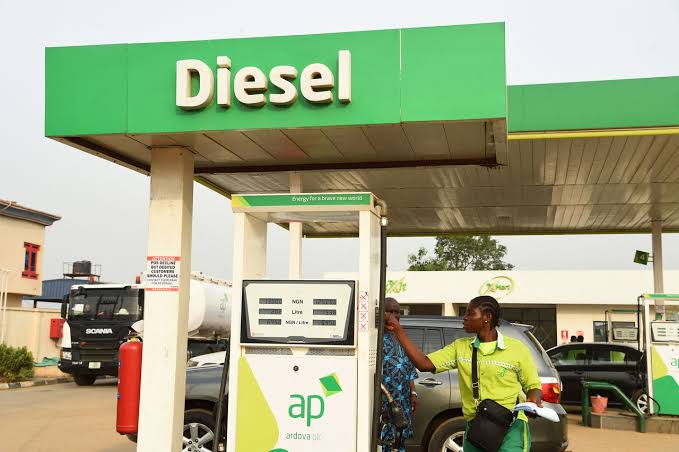According to oil marketers, the price of the product has increased from N600 to between N900 and N950 per litre due to the implementation of a 75% value added tax on automotive gas oil, also known as diesel, and the foreign exchange crisis in Nigeria

On Monday, August 14, the marketers urged the Federal Government (FG) to take immediate action, claiming that their inability to obtain US dollars was preventing them from importing diesel.
Bennett Korie, the national president of the Natural Oil and Gas Suppliers Association of Nigeria (NOGASA), stated during a briefing in Abuja that the cost of PMS will increase as a result of the use of diesel for transportation of petroleum products.
The price crisis brought on by the rising dollar rate, he continued, must be swiftly addressed by the federal government or both products’ prices may rise beyond what is currently anticipated.
Before they started talking about taxes on diesel, the price of diesel was around N600.
It is now widely discussed how the dollar is doing.
The situation is chaotic, so we advise the government to take action to address the dollar problem or else diesel and gasoline prices will increase beyond what they are now. “.
Korie suggested that in order to establish a uniform dollar rate that is agreeable to all parties, the Central Bank of Nigeria (CBN) should meet with stakeholders like Bureau De Change operators.
“Therefore, the only option is to act decisively. Call the BDC and ask them to sit down with CBN to establish a single, acceptable uniform rate. We didn’t pay for this. You can sit down and state, “If you want to sell to us, this is the amount we will pay you, and if you want to sell, don’t sell for more than this price.”. And in doing so, they can have control over the dollar.
Yes, Mr. Dot President advocated free trade, which is normal, but the direction things are headed will cause a lot of damage to us, he warned.
Also, he requested that modular refineries be given top priority by the government.
“The government must provide crude oil to these refineries; at the very least, we have modular refineries that can process 5000–10,000 barrels per day.
We borrow from them, but occasionally we borrow this week and the next week we won’t borrow because they forbid crude oil. As a result of the lack of supply, we don’t depend on them. They will have an impact if they are receiving crude oil on a daily basis, he added.
He also bemoaned how bad the roads were in Nigeria, especially the ones between Warri and Abuja.
“Today, we import trucks using dollars, but since the roads are bad, it won’t last. Because of this, you notice that we import cars and trucks on a daily basis. If you fix the roads, however, you’ll notice that we import fewer vehicles and spare parts into this nation. It is prohibited to travel, for instance, between Warri and Abuja.
“Our trucks have been there for the past two weeks, but they can’t move. Our drivers are murdered and kidnapped. We are losing money. One of my drivers was gone for more than eight days; when he returned, we did not recognize him,” he said.
If not, we might have trouble bringing the product, so this needs to be addressed. Because of the road, you will notice that some gas stations are empty if you look around. Therefore, if they don’t fix it, it will stop on its own, he warned, and the government should treat this information as important.





